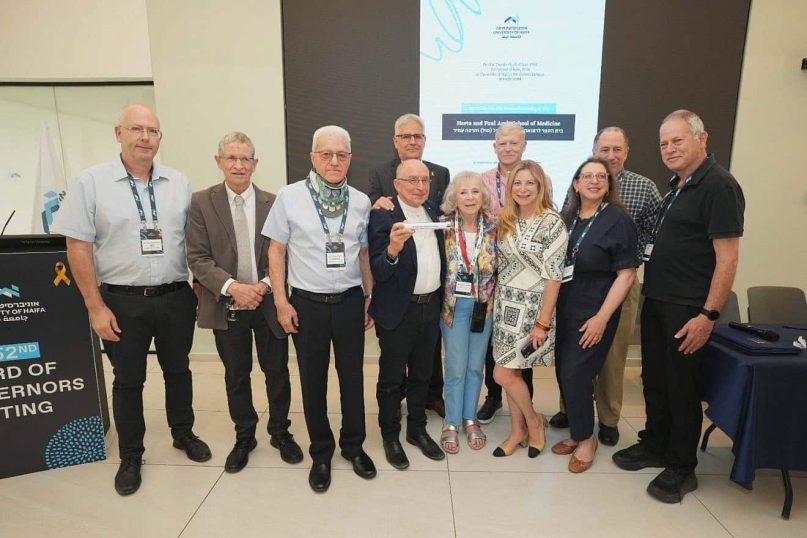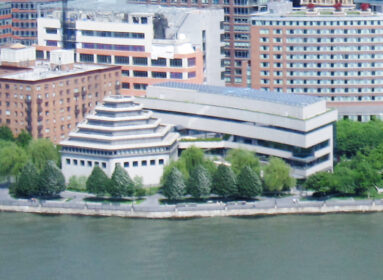
(University of Haifa) The University of Haifa on Sunday inaugurated the building that will be home to its forthcoming Herta and Paul Amir School of Medicine, which is poised to transform the trajectory of the university and its impact on Israeli society.
The university’s 52nd Board of Governors meeting featured a special cornerstone laying ceremony for the building, which is slated to open its doors at the end of next year. The new facility is made possible thanks to a 200 million NIS ($55 million) gift from the university’s top donors, Herta and Paul Amir. University of Haifa has also raised an additional 50 million NIS ($14 million) toward the construction of the new school, which will be led by Professor Haim Bitterman, one of the most respected medical professionals in Israel.
The medical school will address Israel’s pressing national needs in medicine, including an acute shortage of physicians, especially in the northern region where the University of Haifa is situated. Currently, 60% of all of Israel’s medical doctors are trained outside of Israel and nearly half of Israel’s medical doctors are age 55 or older, while the number of medical graduates in Israel is the lowest among the Organization for Economic Cooperation and Development (OECD) nations. Space in Israeli medical programs, meanwhile, is limited.
The university is rising to these major challenges by building a first-of-its-kind university teaching hospital along with Carmel Medical Center and Clalit Health Services. The 1,200-bed hospital will feature state-of-the-art medical services; a focus on patient-centered care; outstanding ICUs; and cardiovascular, thoracic, and surgical oncology departments. The medical school will also strengthen the healthcare system in the north through its cooperation with Carmel, while providing scholarships and other incentives to help keep its graduates in the region.
“Over the years, Paul and I have had the goal to support the State of Israel, particularly its northern region,” Herta Amir said. “Establishing the University of Haifa’s School of Medicine fulfills our vision. Providing the country with another medical school is critical, especially during this challenging time, when Israel’s medical system is under much stress. I’m proud to be part of such an exciting project.”
Prominent individuals in Israel’s healthcare industry attended the cornerstone-laying ceremony, including professor Yossi Makori, chairman of the planning and budgeting committee at Israel’s Council for Higher Education; Eli Cohen, CEO of Clalit Health Services; and Dr. Avi Goldberg, CEO of the Carmel Medical Center.
“The Council for Higher Education understood the importance of establishing a school of medicine at the University of Haifa,” said Makori. “This is an opportunity to not only expand medical studies in Israel but to provide one that takes into consideration the unique needs of the country’s North. The University of Haifa, which has a strong commitment to the region, is the right institution to execute such an initiative. This new medical school will be a beacon of hope, a center of outstanding research, and will attract the great minds of our time who will become the professional and humanitarian leaders of tomorrow. The school will encourage faculty and students to conduct groundbreaking research that will address the demands of contemporary medicine.”
The future school’s curriculum has been submitted to the Council for Higher Education for approval; and registration for its first cohort, consisting of dozens of students, is set for the end of 2025.
The Herta and Paul Amir School of Medicine will be an innovative institution whose mission is aligned with meeting the ever-evolving needs of the 21st century. For example, the school will be a leader in telemedicine and will offer remote monitoring and diagnostics based on extensive data. Additionally, the school will offer a unique focus on community, therapeutic and social aspects of the medical field, with a track planned together with the university’s Welfare and Health Sciences faculty. Finally, the school will also feature an advanced simulation center that will be equipped with state-of-the-art AI and virtual-reality technologies so students can meet the challenges associated with practicing medicine in the 21st century.
“The doctors of the 21st century must have a certain set of skills beyond, of course, understanding classical medical concepts,” Bitterman said. “They need to master new technologies, know how to treat people remotely through a computer screen or a phone and understand the needs of their community. Today, we acquire these skills while working in the field, which has its advantages and disadvantages. While working with other organizations may seem trivial, many of us have seen fallout when communication between parties doesn’t work as it should and it can negatively harm a patient. We want the next generation of doctors to take all these considerations into account, so they are ready for the challenges of the 21st century.”
PHOTO: Haifa Univ Medical School
CAP: The inauguration of the Herta and Paul Amir School of Medicine at University of Haifa. Credit: Courtesy.







 Southern New England Jewish Ledger
Southern New England Jewish Ledger














